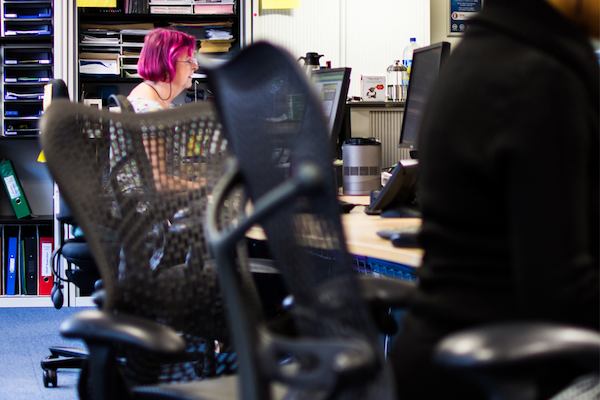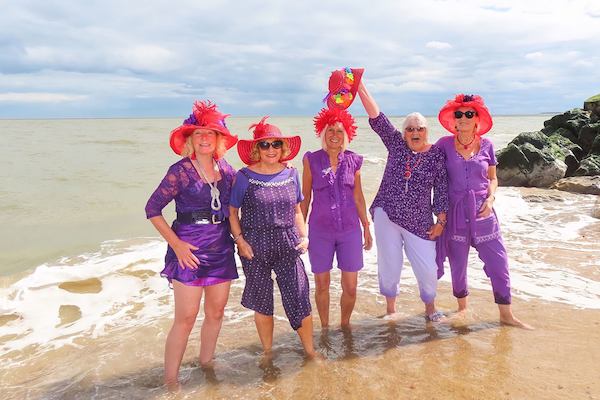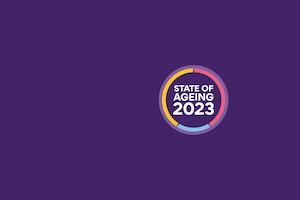Persistent ageist myths revealed as Age Without Limits campaign moves into second year

Our Age Without Limits anti-ageism campaign enters its second year and is calling on everybody to notice, challenge and change the country’s negative attitudes towards ageing and older people.
The campaign's new research reveals that ageist and unfounded stereotypes about the abilities of people in their 50s and 60s to contribute to the workforce are still held by a significant proportion of the population.
A “worryingly high” proportion of the country believe ageist myths around older workers’ competency and value in the workplace, a new survey from the Age Without Limits campaign reveals.
The survey reveals that ageist assumptions around older workers’ ability to work quickly, to be adaptable, to cope with technology and to be a long-term asset for an employer persist – especially among men, younger generations and individuals with the highest educational qualifications who are most likely to have responsibility to hire and manage people in their 50s and 60s.
The Age Without Limits survey reveals that one in four people (24%) think it does not make business sense to employ someone over 50 because they will be a slow worker who will not be able to adapt.
More than one in five people (22%) also think it is a waste of resources to give in-job training to someone over 50 because they do not think older workers are likely to stay in their role for long, according to the survey commissioned by the Centre for Ageing Better.
The survey also reveals that around one in three members of the public (32%) think that people become less competent using technology as they get older.
The stats have been released to mark the first anniversary of the Age Without Limits campaign, the country’s first national anti-ageism campaign.
Age Without Limits is marking the start of its second year with a three month nationwide advertising campaign calling on everybody to notice, challenge and change the country’s negative attitudes towards ageing and older people.
The campaign aims to end the negative treatment of older people based on their age wherever and however it occurs. Ageism can have a detrimental impact on people’s job prospects or healthcare treatment, leads to a relentlessly negative depiction of ageing in advertising and the media, can cause older people to be marginalised from society and can lead everyone to think negatively about their own futures.
By changing the way we all think and act about ageing, the campaign aims to open up greater opportunity for everyone to age without the limits of ageism.
Dr Carole Easton OBE, Chief Executive at the Centre for Ageing Better, said:
“The proportion of people who fail to see the value and benefits of employing people in their 50s and 60s is worryingly high, but sadly also not surprising.
“Our Age Without Limits campaign has previously highlighted the workplace as one of the most common situations in which people to experience ageism. It is so dispiriting that these attitudes persist when older workers have such potential to tackle skills shortages, help businesses to thrive and grow our national economy.
“It is also concerning that the prevalence of ageist attitudes is higher among people with the highest educational qualifications who are most likely to make decisions around hiring, promoting and developing workers who are in their 50s and 60s. Little wonder that older workers are less likely to receive in-work training, are more likely to be made redundant and experience greater difficulties finding work.
“It doesn’t have to be this way. By noticing and challenging ageism in the workplace, we can change employer attitudes to older workers and help everyone to fulfil their potential in later life.”
The new research reveals pronounced differences in the views of men and women including:
- More than one in four men (27%) think it does not make business sense to employ someone over 50 compared to one in five women (21%).
- Men (26%) are also more likely to agree it is a waste of resources to provide training for staff over 50 than women (18%).
- More than one in three men (37%) believe that people become less competent with technology as they get older, compared to one in four women (27%).
The research also showed contrasting views among different age groups and generations including:
- does not make business sense to employ an older worker (48% vs 4%) or give them in-job training (36% vs 3%).
- Almost half of 25-34-year-olds (46%) think that people become less competent with technology as they get older compared to one in five (22%) people aged 65 and above.
And the research shows that individuals with the highest qualifications (Level 4 or above which includes degrees and doctorates) are more likely to hold ageist assumptions about older workers than people with lower educational attainment, including:
- One in three (31%) people with a Level 4 qualification or above thinks it does not make business sense to employ someone over 50 – almost twice the proportion of people with a Level 3 qualification (17%).
- More than one in four (29%) people with a Level 4 qualification or above thinks it is a waste of resources to give in-job training to a staff member over 50 – more than twice the proportion of people with a Level 3 qualification (13%).
- People with a Level 4 qualification or above are also more likely than people with lower educational qualifications (35%) to think that people become less competent with technology as they get older.
The Age Without Limits campaign launched in January last year and held a nationwide action day in March as well as hosting a free age-friendly photo exhibition in London.
Since launching the campaign, the proportion of adults in England who have heard "lots about ageism" has almost doubled.
The new mass-reach advertising campaign is entitled “It’s not ageing, it’s ageism” and will show the real effects of ageism and how the building blocks of our lives as we get older can be limited by the attitudes of others – the jobs we can get, the ways we can express ourselves, the ambitions we can pursue.
The campaign emphasises that this is not inevitable and together, we can change these negative attitudes towards ageing and older people.
Age Without Limits campaign supporter Danielle Barbereau, from Sheffield, said:
“From my own experience, I’ve felt ageism in the workplace when I was made redundant from my senior management role and struggled to find a replacement role in the same sector. I was not the ‘right fit’ for similar jobs and ‘over-qualified’ for more junior roles. It left me feeling so frustrated that I decided to have a complete career change and I set up my own business, using my skills in a different way and now I am thriving.
“I also know that this is an issue that goes much wider than just that the workplace. Ageism can happen anywhere in your life and in any interaction you might have with someone. And when you start noticing it, you start to see just how common it is and how it can impact the things you think and do.
“I don’t want to be limited by people’s negative assumptions about me because of my age, and that’s why the campaign from Age Without Limits is so important for us all to be a part of. Because, hopefully, we’ll all be old one day.”
Katherine Crawshaw, Co-head of Age Without Limits campaign at the Centre for Ageing Better, said:
“Ageism in the workplace is a serious and widespread issue that is holding back older workers, employers and the economy. There are age discrimination protections in place but they provide support to just a small minority of the people impacted.
“But ageism goes much deeper into our society than just the workplace. The impact of ageism can be felt in many different ways, from being denied the healthcare treatment you need because of your age, to ageist comments you might hear that erode away at your self-confidence and sense of purpose.
“We all have a role to play in noticing ageism in our own attitudes to ageing, and we all have a role to play in helping to challenge ageism we might see or hear in the workplace, in the café, in the pub, on social media or amongst our friends and family. Only by doing so can we hope to change society for the better and end ageism.”




